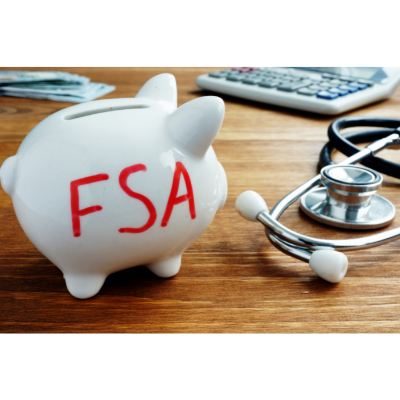What is a Flexible Spending Account (FSA)?

A Flexible Spending Account (FSA) is a type of savings account that allows employees to contribute a portion of their earnings to pay for qualified health care expenses. An FSA is most often used as a supplement to a group health care plan to pay for expenses with pre-tax money.
An FSA can be used to pay for eligible health care, vision and dental expenses for yourself, your spouse, or eligible dependents. Money contributed to the account is deducted from your paycheck and is not subject to income or payroll taxes.
The 2022 contribution limit is $2,850. So, for example, someone earning $60,000 that elects to set aside the full contribution would only be taxed on $57,150, saving more than $600 in federal income taxes.
With an FSA, the money comes out of your paycheck, before taxes, in regular increments. However, these accounts are typically “pre-funded” by the employer, meaning the full contribution amount is available to spend at the beginning of the year. One caveat: If you leave your job in the middle of the year, you may have to pay back money that has been spent but has not yet come out of your paycheck.
An FSA is owned by the employer, and you forfeit any unused balance unless the employer allows a carryover, which is capped at $570 for 2022. Alternatively, an employer may, but is not required to, offer a grace period of up to 2.5 months into the next year in which to use leftover money. A carryover and a grace period cannot both be offered.
FSAs follow the same rules of your health plan. In other words, you can only enroll in an FSA as either a new hire, during the open enrollment period, or if there is a qualified event (marriage, divorce, or birth of a child, to name a few).
All benefit-eligible employees may enroll in an FSA, even if they are not enrolled in a group medical plan.
What can an FSA be used for?
You may be surprised: Hundreds of products, like breast pumps, eye exams and eyeglasses, chiropractor visits, dental treatments, sunscreen, smoking cessation courses, and first aid supplies. A comprehensive list of what’s eligible can be found at the FSA Store.
A Limited Purpose FSA can be used only for dental and vision expenses.
Highlights
- Annual contribution limit (2022): $2,850
- Money is available at the first of the year
- Unused funds are lost at the end of the year, unless an employer permits a carryover or grace period
- If you leave your job, you cannot take an FSA with you
- You can only enroll at specific times, such as when you’re hired, during an open enrollment period or if there is a qualifying event (marriage, divorce, birth of a child, etc.)
- Self-employed individuals are not eligible for an FSA
Tax advantages:
- Money contributed to an FSA is not subject to income or payroll taxes
- Funds used to pay for qualified medical expenses are not subject to income tax
Other types of FSAs
Two other types of FSAs are used for specific purposes:
- A Dependent Care FSA (DCFSA) is used to reimburse expenses related to care of a child under 13 or someone who is mentally or physically disabled. This includes day camp and before- and after-school care. For more information, read How Do I Use a Dependent Care FSA?
- A Commuter FSA is used to reimburse expenses related to mass transit and parking. For more information, read What is a Commuter FSA Used For?
Note: Neither a DCFSA nor a Commuter FSA may be used for health care expenses.
Interested in other ways to save money for health expenses? How Does an FSA Differ From an HSA?
We think you'll also want to read: How Can I Use My Health Care Savings in Retirement?


Share Your Thoughts